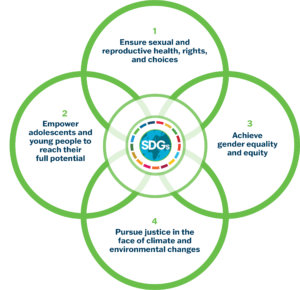The Population Council’s 2023–2030 Strategic Plan enables us to align across the organization to accelerate the delivery of our mission; identify contributions we can make through the rest of the decade in a tangible and concrete way; and ensure our vision and values reflect who we are today and moving forward.
For 70 years, the Population Council has transformed global thinking on critical health and development issues through our social science, public health, and biomedical research.
As the world confronts multiple social, economic, political, and environmental crises, there is increasing need for high-quality and clearly communicated evidence to inform smart policies and sound investments.
At the Population Council, we are redoubling our efforts to make the greatest contributions through new ideas, rigorous evidence, and innovative solutions.
Over the next eight years, we will harness our expertise to advance four global goals that reflect the urgent problems the world faces. Through these, we will contribute to the United Nations 2030 Sustainable Development Goals (SDGs), which seek to end poverty, protect the planet, and ensure that all people enjoy peace and prosperity.
An Equitable and Sustainable Future for Everyone, Everywhere

The Council’s strategic goals are: 1, Ensure sexual and reproductive health, rights, and choices; 2, Empower adolescents and young people to reach their full potential; Achieve gender equality and equity; and 4, Pursue justice in the face of climate and environmental changes. The four goals are stemming from the sustainable development goals in the center.
Our four goals are inextricably intertwined; fulfilling one advances the others and failing on one undermines progress on all. The complexity of their interactions requires the Population Council’s multidisciplinary approach and transdisciplinary training.
We will continue to conduct pioneering research and develop innovative products and tools across our social science, public health, and biomedical portfolios. Our ability to convene experts, provide scientific and policy advice, produce accessible evidence, publish peer-reviewed journals, and cultivate future leaders will amplify our impact.
Our Vision
An equitable and sustainable world that enhances the health and well-being of current and future generations.
Our Mission
We generate ideas, produce evidence, and design solutions to improve the lives of underserved populations around the world.
We take a multidisciplinary, intergenerational, life-cycle approach that contributes to four global goals, including the connections between them:
- Ensure sexual and reproductive health, rights, and choices
- Empower adolescents and young people to reach their full potential
- Achieve gender equality and equity
- Pursue justice in the face of climate and environmental changes
Strategic Objectives
Leveraging our global talent, local presence, and unique expertise, we collaborate with partners including governments, service providers, and civil society organizations on five objectives to achieve our vision and mission:
- Thought leadership. Be a recognized thought leader and knowledge partner for locally driven research solutions.
- Research. Pioneer cutting-edge data tools and methods, conduct multidisciplinary research, and systematically build bodies of evidence.
- Product development. Be the leading innovator of high-quality sexual and reproductive health products for the global market.
- Research impact. Catalyze the use of data and evidence-based tools to inform smart policies and sound investments.
- Sustainability. Grow the next generation of scientists and researchers.
Values
- Excellence and innovation. We take a rigorous scientific approach to develop innovative products and evaluate the efficiency and effectiveness of policies and programs.
- Collaboration and partnership. We foster a multidisciplinary, cross-sectoral, and collaborative culture to promote learning, apply research results, and achieve impact.
- Diversity, equity, and inclusion. We believe in the power of diverse perspectives, championing all voices, treating one another with dignity and respect, and building trust and belonging in the scientific process and within the Council.
- Accountability. We are honest and transparent with our colleagues, collaborators, and the populations we serve and hold ourselves accountable for our commitments.
- Ethics. We conduct our research under the highest ethical standards and are committed to open science.